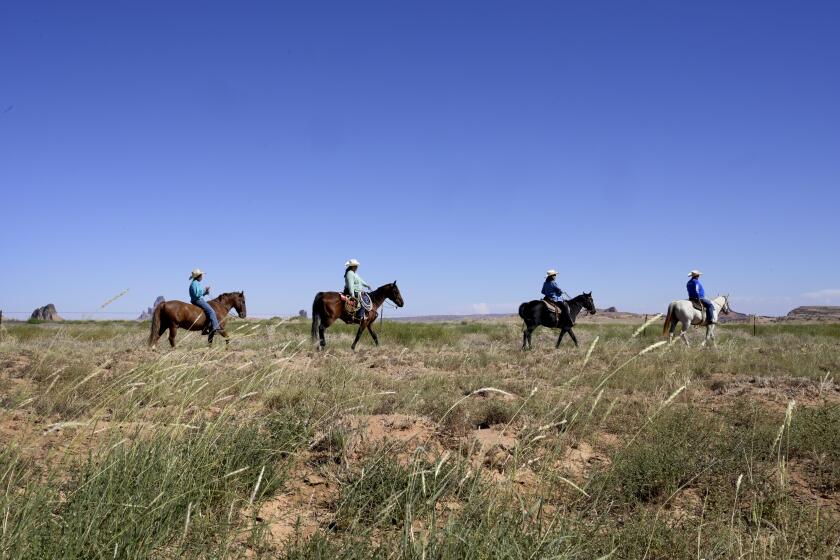Bush Will Face Pressure to Appoint Another Black to Court : Judiciary: To not do so would be seen as saying there are none capable of filling post. But President is known to oppose reserving seat for any group.
Justice Thurgood Marshall’s resignation from the Supreme Court presents President Bush with a decision that has far different implications from that which he made when filling the high court vacancy a year ago and, indeed, from those made by his predecessors over the last two decades.
Like other Supreme Court nominations, this one gives the President an opportunity to shape American justice; in this case, perhaps well into the next century.
But it will also challenge him to send a specific signal about the role of minorities in American society at a time when the nation may be approaching an era of heightened racial polarization. The departure of the high court’s only black justice occurs amid a national debate over the future of civil rights policy and calls attention to the slim roster of black leaders at the top of the political hierarchy.
Thus, Bush is facing a watershed of sorts. This nomination is of enormous symbolic importance in a nation in which only one governor is black, no blacks serve in the Senate and the President, embroiled for more than a year in a dispute over civil rights legislation, insists that he wants to bring minorities, particularly blacks, into the mainstream of American life.
At the same time, here is a chance to cement the court’s conservative majority.
“The dynamics are so complicated,” said Yale Law School Prof. Drew Days, an assistant attorney general for civil rights during the Jimmy Carter Administration.
“George Bush has an opportunity to approach greatness. He can do something that is extraordinary--to demonstrate that he is not an ideologue,” Days said. “If he appoints someone who is not ideologically kindred, if he feels the court as an institution needs a certain amount of balance and variety of perspectives and different senses of how the law operates in this country--that would be greatness.”
But, Days added, in a nod toward the pressure conservative Republicans are likely to put on Bush should he veer sharply from the path of moderate-to-conservative nominees with which he has filled the federal judiciary, “others might call it (political) suicide.”
For his part, Bush is giving no hints about the direction he will take.
His stated requirements are few, modest and non-ideological:
“Somebody who believes in the Constitution of the United States. Somebody who will be able to serve for a while,” the President said tersely when asked about the characteristics he would seek in his second nominee to the Supreme Court.
A year ago, when Justice William J. Brennan Jr. resigned, a set of potential candidates was drawn up that also met another, unstated, requirement: A nominee who could achieve relatively speedy approval from the Senate, with no risk of embarrassing political controversy that would drag Bush through a fight like the one that swallowed up Ronald Reagan’s nomination of Judge Robert H. Bork in 1987. Bush quickly came up with David H. Souter, a little-known justice on the New Hampshire Supreme Court.
With Senate Judiciary Committee hearings on his next nominee likely to take place in late summer or early autumn, a year before the 1992 presidential campaign will be in full swing, Bush once again has every reason to want to avoid becoming entangled in a drawn-out nomination fight.
That Bush will come under pressure to nominate a black to replace Marshall, the first and only black to sit on the Supreme Court, is without question.
“To do otherwise would suggest that there is no African-American in the entire United States qualified to sit on the Supreme Court, a position that, at the least, would be awkward to take for a President running for reelection,” Sheldon Goldman, professor of political science at the University of Massachusetts, wrote in last month’s Journal of the American Judicature Society.
Indeed, Bush may recruit his nominee from the ranks of moderate or conservative black legal figures; Judge Clarence Thomas of the U.S. Circuit Court of Appeals for the District of Columbia and Judge Amalya L. Kearse of the U.S. appellate court in New York are mentioned frequently.
By so doing, the President could not only keep at the top reaches of American society a highly visible black figure, he could signal a view that “we see blacks as Establishment people now,” said Robert Dallek, a professor of American history at UCLA and an expert on the American presidency.
At the same time, Bush is known by those close to him to be resistant to the idea that, in the words of one Republican political source, “any seats are being set aside for any group or person.”
“There used to be a seat on the court just for Jews,” said one White House official, “but we finally got over that a number of years ago, and we don’t like the idea of having another quota seat for a minority.”
Nevertheless, one source said, “it’s very hard not to appoint a member of a minority group to that seat, given the circumstances--not just that it is a black, but that it is Thurgood Marshall, and all he has meant to the civil rights movement, who is being replaced--coupled with the controversy over civil rights legislation and the decline in the President’s standings with blacks.”
Washington Bureau Chief Jack Nelson and staff writers William J. Eaton and Sam Fulwood III contributed to this story.
More to Read
Get the L.A. Times Politics newsletter
Deeply reported insights into legislation, politics and policy from Sacramento, Washington and beyond. In your inbox three times per week.
You may occasionally receive promotional content from the Los Angeles Times.







